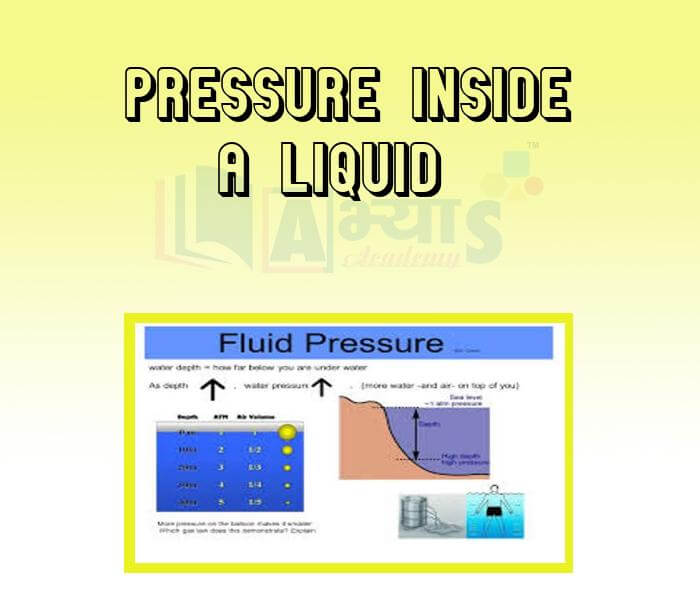Pressure inside a Liquid and its Variation












Pressure inside a Liquid and its Variation
Pressure in liquids: Like solids, all liquids and gases (together called fluids), apply pressure. Unlike solids, the liquids do not have a definite shape. They take the shape of the containing vessel. Unlike solids the pressure in the liquids is not the thrust per unit area. It depends upon the depth (height) and the density of the liquid. Solids exert pressure on a surface due to their weight. Fluids also have weight. So, they also exert pressure on the base and walls of container in which they are enclosed. What happens when you fill a balloon with water? The walls of the balloon bulge outwards due to the pressure of the water inside. If you keep on filling water in the balloon, what do you think will happen? The balloon will burst because the pressure on the walls of the balloon will increase beyond what its walls can withstand.
Pressure at a point inside a liquid does not depends on: | |||
| Right Option : D | |||
| View Explanation |
Pressure at a point inside the liquid does not depend upon: | |||
| Right Option : D | |||
| View Explanation |
Two stretched membranes of area 2 sq cm and 3 sq cm are placed in a liquid at the same depth. The ratio of the pressure on them is: | |||
| Right Option : A | |||
| View Explanation |
Students / Parents Reviews [10]
It has a great methodology. Students here can get analysis to their test quickly.We can learn easily through PPTs and the testing methods are good. We know that where we have to practice

Barkha Arora
10thI have spent a wonderful time in Abhyas academy. It has made my reasoning more apt, English more stronger and Maths an interesting subject for me. It has given me a habbit of self studying

Yatharthi Sharma
10thAbhyas is a complete education Institute. Here extreme care is taken by teacher with the help of regular exam. Extra classes also conducted by the institute, if the student is weak.

Om Umang
10thMy experience was very good with Abhyas academy. I am studying here from 6th class and I am satisfied by its results in my life. I improved a lot here ahead of school syllabus.

Ayan Ghosh
8thBeing a parent, I saw my daughter improvement in her studies by seeing a good result in all day to day compititive exam TMO, NSO, IEO etc and as well as studies. I have got a fruitful result from my daughter.

Prisha Gupta
8thMy experience with Abhyas is very good. I have learnt many things here like vedic maths and reasoning also. Teachers here first take our doubts and then there are assignments to verify our weak points.

Shivam Rana
7thAbhyas Methodology is very good. It is based on according to student and each child manages accordingly to its properly. Methodology has improved the abilities of students to shine them in future.

Manish Kumar
10thOne of the best institutes to develope a child interest in studies.Provides SST and English knowledge also unlike other institutes. Teachers are co operative and friendly online tests andPPT develope practical knowledge also.

Aman Kumar Shrivastava
10thA marvelous experience with Abhyas. I am glad to share that my ward has achieved more than enough at the Ambala ABHYAS centre. Years have passed on and more and more he has gained. May the centre flourish and develop day by day by the grace of God.

Archit Segal
7thAbout Abhyas metholodology the teachers are very nice and hardworking toward students.The Centre Head Mrs Anu Sethi is also a brilliant teacher.Abhyas has taught me how to overcome problems and has always taken my doubts and suppoeted me.
